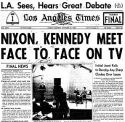 While Trump in Trumplandia attempts to go back in time to the campaign, and while I await Google Maps to show my back yard as a lake on its next update, let’s move on to some more interesting history. Anything, anything but Trump.
While Trump in Trumplandia attempts to go back in time to the campaign, and while I await Google Maps to show my back yard as a lake on its next update, let’s move on to some more interesting history. Anything, anything but Trump.
- Fingernail Clipping. As we enter into the Trump-free Twilight Zone, here’s proof that anything is really more intellectually interesting than 9 x 5: the history of fingernail clipping, especially before we had clippers. Consider: the modern nail clipper is a fairly recent phenomenon, roughly as old as the Swiss Army Knife. Which means that for most of human history, clipping one’s nails was a little harder than digging your rusty clipper out of the medicine cabinet. There were also superstitions: “It is unlucky to cut the finger nails on Friday, Saturday or Sunday. If you cut the on Friday you are playing into the devil’s hand; on Saturday, you are inviting disappointment, and on Sunday, you will have bad luck all week. There are people who suffer all sorts of gloomy forebodings if they absentmindedly trim away a bit of nail on any of these days and who will suffer all the inconvenience of overgrown fingernails sooner than cut them after Thursday.”
- There Their. Did you ever wonder how English ended up with There, They’re, and Their. Wonder no longer. They actually started as very different words.
- Maiden Names. Here’s an interesting essay on the practice of women taking their husband’s names (which is something my wife never did). It is a surprisingly controversial subject, even in 2017. All research on English-speaking women’s marital naming choices since the 1970s shows that the introduction of choice has not produced a wholesale shift away from tradition. Both in the US and the UK, the great majority of married women have continued to take their husbands’ names. The size of the majority has fluctuated over time. The percentage of name-keepers increased sharply in the 1970s, rose to a peak in the 1980s, and then held steady for several years before declining noticeably in the 1990s. By 2010 one US study reported that 94% of native-born married women used their husband’s names. Further, name-keeping is a mark of privilege: Married women who keep their original names are not just a minority, they’re a minority of a minority–they are heavily concentrated in the elite professional class. Name-keeping is strongly correlated with having at least one degree, and you’re most likely to be a keeper if both you and your husband have more than one.
- Futuristic Gas Stations. If you’ve ever driven “Little Santa Monica” in Beverly Hills, you’ve passed it. A really cool Union 76 station near what used to be the headquarters of Litton Industires. But did you ever wonder the history of the station? Wonder no more. Evidently, it was originally planned to be near LAX, but the airport decided they didn’t want it.
- Card Catalog Handwriting. Here’s something only oldsters like me will remember: card catalogs in libraries. Further, they were once handwritten, not typed. When they were handwritten, it turned out that librarians used a special style of writing. Cool. Thanks to Melvil Dewey and a group of librarians, we have “library hand,” a penmanship style developed over the ensuing year or so for the purpose of keeping catalogs standardized and legible.

